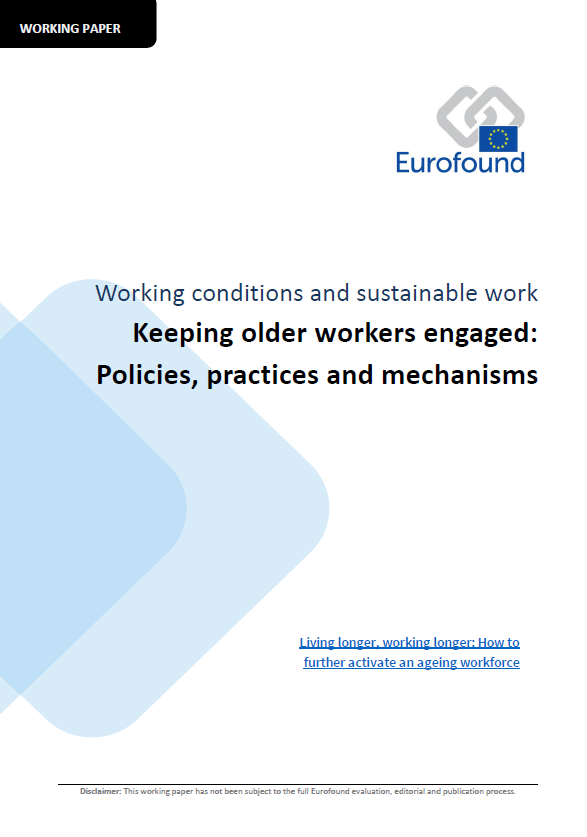EU context
A pesar del considerable crecimiento de las tasas de empleo de los trabajadores de mayor edad registrado a lo largo de la última década en numerosos Estados de la UE, el Informe Conjunto sobre el Empleo de 2017 de la Comisión Europea destaca el potencial para aumentar aún más estos niveles. En 2016, la tasa de empleo para los trabajadores de mayor edad de la UE, de entre 55 y 64 años, se situaba en el 55,3 %, frente al 66,6 % del conjunto de las personas entre 15 y 64 años. El mayor aumento se ha producido entre las mujeres de edad avanzada.
El pilar europeo de derechos sociales proporciona un marco para ayudar a los mercados laborales a adaptarse a nuevos desafíos al tiempo que promueve la igualdad y la solidaridad entre generaciones. Hace hincapié en el derecho a un entorno de trabajo adaptado a las necesidades profesionales del trabajador, a fin de permitirles prolongar su participación en el mercado laboral. Además, el reciente acuerdo autónomo sobre el envejecimiento activo y un enfoque intergeneracional se compromete a facilitar a los trabajadores de mayor edad la participación activa y su permanencia durante más tiempo en el mercado laboral.
La labor de Eurofound
Eurofound tiene un largo historial de experiencia en asuntos relacionados con el envejecimiento de la población activa. La investigación desde los años noventa se ha centrado en la participación en el mercado laboral, el rendimiento laboral, las condiciones de trabajo y las preferencias laborales de los trabajadores de mayor edad en el contexto político del cambiante perfil demográfico europeo. El trabajo se ha centrado también en el apoyo público y las iniciativas a nivel de empresa que fomentan el empleo de los trabajadores de edad avanzada. En esta labor se ha analizado a las mujeres trabajadoras de mayor edad, destacando las tasas de empleo en aumento y su creciente proporción de la mano de obra, especialmente en el colectivo de edad entre 55 y 64 años.
Datos de encuestas
Las principales encuestas de Eurofound proporcionan una variedad de datos sobre la situación de los trabajadores de edad avanzada. La sexta Encuesta europea sobre las condiciones de trabajo (EWCS) analiza cómo los trabajadores de mayor edad comparan diferentes dimensiones de la calidad del empleo. Si bien los trabajadores de mayor edad son menos propensos a perder el empleo que los trabajadores jóvenes, los datos muestran que los trabajadores de mayor edad sienten que si perdieran el trabajo no encontrarían un nuevo empleo de remuneración similar, y tendrían incluso dificultades para volver a ingresar en el mercado laboral.
Un estudio basado en la quinta Encuesta europea sobre las condiciones de trabajo (EWCS) de Eurofound analiza las características de la mano de obra de edad avanzada y del trabajo en diferentes edades, así como los factores que hacen que el trabajo sea sostenible para una mano de obra en envejecimiento: buenas condiciones de trabajo, bienestar físico y mental y equilibrio entre la vida privada y la vida laboral.
La Encuesta europea sobre la calidad de vida de Eurofound (EQLS) proporciona conclusiones relacionadas con la edad acerca de diversas dimensiones de la calidad de vida en Europa. Un análisis de las preferencias laborales tras los 50 años se basa en conclusiones de la tercera EQLS y muestra que numerosos trabajadores de edad avanzada prefieren trabajar menos horas, incluso teniendo en cuenta sus necesidades financieras. Facilitar este mayor alineamiento de las horas de trabajo con las preferencias puede permitir a los trabajadores trabajar durante más tiempo y motivarlos a ello.
Vidas laborales más largas
Recientemente, Eurofound se unió a otras tres agencias de la UE para analizar el trabajo adaptado a todas las franjas de edad en Europa, los desafíos políticos asociados con una mano de obra que envejece y soluciones innovadoras.
Muchos trabajadores no pueden trabajar hasta la edad legal de jubilación, o no se sienten motivados para ello. No obstante, también hay un colectivo que puede y está dispuesto a trabajar más allá de dicha edad. Eurofound ha estudiado este creciente fenómeno consistente en trabajar tras la jubilación.
Las investigaciones recientes se han centrado en la prolongación de las vidas laborales mediante regímenes flexibles de jubilación, analizando en particular los regímenes parciales de jubilación que pueden facilitarlo. Las revisiones a mitad de la carrera profesional pueden contribuir también a prolongar las vidas laborales. La investigación ha examinado cómo estas revisiones pueden ayudar a aclarar las opciones de los trabajadores de permanecer trabajando hasta una edad de jubilación más tardía. Pone de relieve diferentes instrumentos desarrollados por las empresas para mantener a los trabajadores envejecidos.
Otras investigaciones estudian iniciativas nacionales y sectoriales llevadas a cabo por Gobiernos e interlocutores sociales para mantener a los trabajadores de edad avanzada en el mercado laboral, entre las que se incluyen incentivos financieros y condiciones mejoradas. En un proyecto anterior se analizaban las iniciativas de gestión de la edad introducidas antes y después de la recesión, a fin de destacar buenas prácticas entre empresas en Europa.
Recursos

















